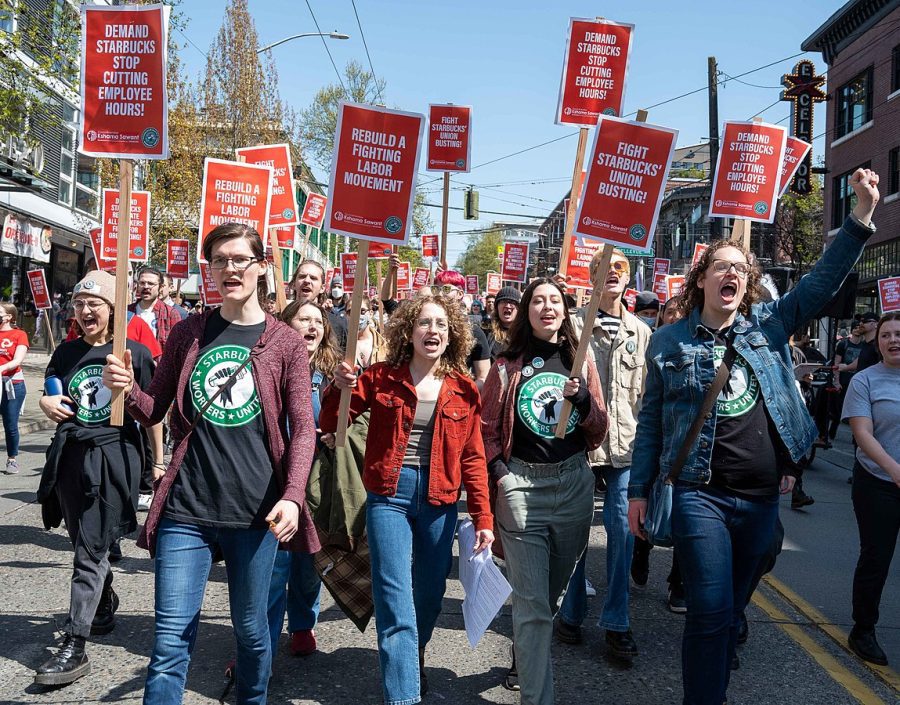Opinion | We need unions now more than ever
Photo courtesy of Elliot Stoller/Wikimedia Commons
A Starbucks labor union protest occurs in Seattle on April 23. Senior columnist Nathaniel Langley argues that labor unions are more crucial than ever as workers struggle to receive fairness from large corporations.
Sep 5, 2022
A new rhythm rises across the nation — a rhythm led by the working class and youth. Unions have found new energy as unionization efforts accelerate at fast food chains and workplaces in the United States.
In a recent poll conducted by Gallup, 68% of Americans approved of unions — the highest approval since 1965. Likewise, among those 18-34, union approval holds at an astonishing 77%.
Despite this boosted support, however, the percentage of Americans in a union holds at 9% — a value that’s remained steady for 20 years. The 9%, nonetheless, is a steep regression from the record high of about 33% participation more than 50 years ago, according to NPR.
Still, with news of the first Chipotle union — alongside impressive efforts from Starbucks (with more than 220 unionized stores) and Amazon at 8,300 union members — unions have arrived at their essential moment; a moment that can’t have its strength surrendered.
Lauren Kaori Gurley, a journalist for The Washington Post, states COVID-19 has led to a “dramatic realignment in the relationship between workers and employers in the past two years.” Due to the vast labeling of working-class workers as “essential,” and labor shortages, employees possess better leverage to be recognized and rewarded.
Get The Daily Illini in your inbox!
In Bloomberg, Paulina Cachero reports since COVID-19, the bottom 50% of US households “are in the strongest relative financial position in a generation.” As working-class wealth grew by 2.8% thus far this year, inequality has slightly diminished, yet Cachero asserts the “top 1% controls about 35% — a share that has mostly trended upward over the past four decades.”
With inequality continually immense but labor strained, unions stand as one of the premier solutions for the working class to receive a fair share.
These organizations stand against corporate greed and ensure power is vested with the worker. Moreover, the bargaining power of a union — i.e., negotiating contracts — is never to be underestimated: The University community recently witnessed union success with the Service Employees International Union Local 73 winning a superior contract.
In mid-August, SEIU Local 73 protested over wage increases and sent strike notices to the University. After asking for a five-dollar hourly increase, the University offered service workers a mere 25 cents. At the protest, Edward Dawson, an SEIU Local 73 member, declared, “We only get cents on the dollar, and every year you hear about coaches getting 3 million.”
Around two weeks later, Dawson and other union members achieved stronger contracts: A “$2.50 (increase) throughout the two-year agreement… wage increases for night workers, lighter work clothing, overtime and parking changes.” After pressuring the University, service workers achieved an honorable contract.
Although the new, younger-led unions of Starbucks, Chipotle and Amazon haven’t reached comprehensive bargaining, each is a surging power standing fighting for the working class.
In response to unionization efforts, Chipotle’s chief corporate affairs officer claimed, “We’re disappointed that the employees at our Lansing, MI, restaurant chose to have a third party speak on their behalf.” Professing unions are “third parties” who don’t speak for workers, the incompetence of these corporations is further revealed.
Rather than recognize their misdeeds to employees, those like Chipotle stand for greed and maltreatment rather than accommodate their working-class employees.
Furthermore, union efforts, particularly at chains like Chipotle and Starbucks, have succeeded due to their unique structure. Instead of being franchised, these chains are predominately corporate-owned, Jonah Furman affirms in LA Progressive.
Being corporate-owned, these organizations directly interact with their corporate owners. Likewise, their negotiations can impact all other corporate-owned stores.
Quoted in Furman’s piece, Harper McNamara, an employee at the now-unionized Lansing, Michigan location, estimates “the average Chipotle worker stays about four months.” McNamara contended a Chipotle union would help fix scheduling issues — a matter Chipotle paid $20 million to New York City for violating “fair workweek” laws.
These large corporations have entrenched themselves against helping their workers. Starbucks, for example, has permanently closed locations such as its Plaza location in Kansas City citing “safety worries.” “Coincidentally,” workers were forming their union before getting shut down…
Nevertheless, the journey to fair bargaining for these unions will be treacherous. Seth Goldstein, a lawyer for Amazon Labor Union, proclaimed, “I think Amazon is going to drag out negotiations unless we put pressure on them.”
As witnessed with SEIU Local 73’s success, pressure is one of the foremost strategies to win improved conditions. The path is never easy, but the fight’s worth it: Better lives and wages are on the line.
Union victories are increasing as “essential” workers reclaim their power. Still, true victory doesn’t exist until wage increases and better conditions are enshrined in bargained contracts.
The energy sprouting from Starbucks, Chipotle, Amazon and other unions is inspiring, but it’s not permanent. Their corporations won’t happily approach the bargaining table, and no union should expect them to. Still, with millions of dollars aimed against them, unions need our support.
Without a collective force against corporations, workers struggle to obtain long-needed equity. Whether you’re in a union or not, we all benefit from their endeavors to empower the working class and oppose corporate greed. Fighting their fight saves us all and denies the greedy their victory.
Nathaniel is a senior in LAS.






